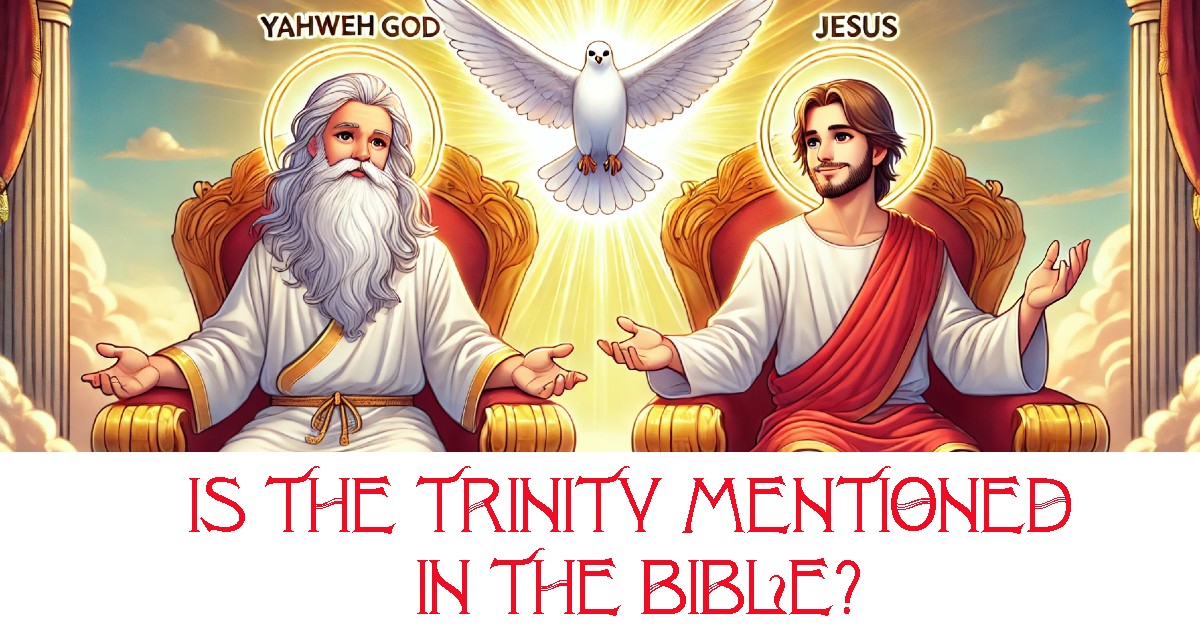Prepare to Be Shocked.
For centuries, the doctrine of the Trinity—the belief in God as Father, Son, and Holy Spirit, co-equal and co-eternal—has been at the core of Christian theology. It’s recited in creeds, embedded in worship songs, and taught in churches around the world. But what if we told you that the Trinity, as a formal doctrine, might not be explicitly mentioned in the Bible? Buckle up, because the historical and textual evidence might challenge everything you thought you knew.
The Smoking Gun: The Absence of the Word “Trinity”
First, let’s state the obvious: the word “Trinity” does not appear anywhere in the Bible. Not in the Hebrew Old Testament. Not in the Greek New Testament. The term was first coined by Tertullian, an early Christian theologian, around 200 A.D. This fact alone raises eyebrows. How could such a cornerstone of faith not even be named in the very texts that are supposed to define it?
The Comma Johanneum: A Textual Insertion?
Consider 1 John 5:7-8, often cited as the Bible’s clearest Trinitarian reference in the King James Version (KJV):
“For there are three that bear record in heaven, the Father, the Word, and the Holy Ghost: and these three are one.”
Sounds convincing, right? Here’s the shocker: this phrase does not appear in the earliest Greek manuscripts. It was absent from nearly all Greek texts before the 16th century and is missing in early translations like the Syriac, Coptic, and Latin Vulgate (in its earliest forms). Modern translations like the NIV and ESV omit this passage or include footnotes explaining its dubious origin.
Scholars believe this section, known as the Comma Johanneum, was likely added by a scribe during the Middle Ages, possibly to support Trinitarian debates raging in the church at the time. It quietly slipped into later manuscripts and eventually into translations like the KJV, giving it an air of authenticity it never originally had.
The Baptismal Formula: Authentic or Edited?
Another popular verse is Matthew 28:19:
“Go therefore and make disciples of all nations, baptizing them in the name of the Father and of the Son and of the Holy Spirit.”
At first glance, this seems to scream “Trinity.” But hold on. Early Church Father Eusebius (c. 260–339 A.D.) quoted this verse multiple times in his writings, and interestingly, he cited it as:
“Go and make disciples of all nations in my name.”
No mention of Father, Son, and Holy Spirit. Some scholars speculate that the longer Trinitarian formula might have been a later liturgical addition, reflecting evolving church practices rather than the original words of Jesus.
The Old Testament: Unyielding Monotheism
The Hebrew Scriptures are crystal clear about the nature of God:
“Hear, O Israel: The LORD our God, the LORD is one.” (Deuteronomy 6:4)
Jewish monotheism was uncompromising. The idea of God existing in three persons would have been foreign, if not heretical, to the original authors. There’s no mention of a “Son” or “Holy Spirit” as co-equal entities alongside Yahweh. The Spirit of God (Ruach Elohim) is depicted more as God’s active force, not a distinct person.
Early Christian Diversity: Competing Views
The early Christian world wasn’t the theological monolith many assume. Groups like the Ebionites rejected the divinity of Jesus outright, viewing him as a human prophet. The Arians believed Jesus was a created being, subordinate to God the Father. These weren’t fringe sects; they were influential movements that challenged the emerging orthodoxy.
It wasn’t until the Council of Nicaea in 325 A.D. that the doctrine of the Trinity was formally articulated to counter these divergent beliefs. The Nicene Creed wasn’t just a statement of faith; it was a theological weapon designed to establish uniformity.
What Does This Mean for You?
So, is the Trinity in the Bible? Not explicitly. The doctrine seems to have evolved through centuries of theological debate, ecclesiastical politics, and even textual alterations. This doesn’t mean the concept lacks spiritual significance, but it does raise questions about how much of what we believe is based on Scripture versus tradition.
Sources:
- Bart D. Ehrman, “Misquoting Jesus: The Story Behind Who Changed the Bible and Why”
- Bruce M. Metzger, “The Text of the New Testament: Its Transmission, Corruption, and Restoration”
- Eusebius of Caesarea, “Ecclesiastical History”
- The Codex Sinaiticus and Codex Vaticanus (early Greek manuscripts)
Dare to question. Dare to seek.

